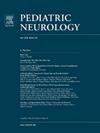Provider Perspectives of Barriers to Delivering Care for Pediatric Functional Neurological Disorder: A Thematic Analysis
IF 3.2
3区 医学
Q2 CLINICAL NEUROLOGY
引用次数: 0
Abstract
Background
Functional neurological disorder (FND) is a multinetwork brain disorder existing at the intersection of neurology and psychiatry. FND often takes significant time to receive diagnosis and treatment. Given these delays, the purpose of the present study was to identify barriers to FND care from the provider perspective.
Methods
The Functional Neurological Disorder Society Pediatric Special Interest Group asked pediatric FND providers to specify barriers to FND treatment in their center in the United States. Two authors conducted thematic analyses to extract themes between respondents’ qualitative responses.
Results
Our analysis found that the US health care system is not adequately designed to provide timely and sufficient treatment for pediatric FND. Four subthemes emerged. First, providers identified limited access to health care professionals (HCPs) with specialized expertise in pediatric FND. The second delineated the lack of HCP education and competence in FND. Third, providers indicated the challenge of coordinating care and establishing bidirectional communication with their colleagues. Finally, providers identified financial support, including insurance coverage, as a barrier.
Conclusions
The present study highlights barriers to care for pediatric patients with FND from the provider perspective in the United States. These barriers existed regardless of geography, treatment type, discipline, or specialty highlighting opportunities to intervene. By improving provider education, general practitioners may gain increased confidence in quickly delivering an FND diagnosis; this could also allow additional providers to become experts in treating FND, thus decreasing delays to initiating care. Additionally, advocacy for increased insurance coverage may also help to eliminate treatment-related disparities for pediatric FND.
儿科功能性神经障碍的障碍:专题分析
功能性神经障碍(FND)是一种存在于神经病学和精神病学交叉领域的多网络脑障碍。FND通常需要很长时间才能得到诊断和治疗。鉴于这些延迟,本研究的目的是从提供者的角度确定FND护理的障碍。方法功能神经障碍学会儿科特殊兴趣小组要求儿科FND提供者明确在其美国中心治疗FND的障碍。两位作者进行了主题分析,从受访者的定性回答中提取主题。结果我们的分析发现,美国卫生保健系统的设计不足以为儿童FND提供及时和充分的治疗。出现了四个次级主题。首先,提供者确定了在儿科FND方面具有专业知识的卫生保健专业人员(HCPs)的有限机会。第二部分描述了FND缺乏HCP教育和能力。第三,服务提供者指出了协调护理和与同事建立双向沟通的挑战。最后,供应商认为包括保险在内的财政支持是一个障碍。结论:本研究从提供者的角度强调了美国儿科FND患者的护理障碍。无论地理位置、治疗类型、学科或专业如何,这些障碍都存在。通过提高提供者的教育,全科医生可以在快速提供FND诊断方面获得更大的信心;这也可以让更多的提供者成为治疗FND的专家,从而减少开始治疗的延误。此外,倡导增加保险覆盖范围也可能有助于消除儿童FND治疗相关的差异。
本文章由计算机程序翻译,如有差异,请以英文原文为准。
求助全文
约1分钟内获得全文
求助全文
来源期刊

Pediatric neurology
医学-临床神经学
CiteScore
4.80
自引率
2.60%
发文量
176
审稿时长
78 days
期刊介绍:
Pediatric Neurology publishes timely peer-reviewed clinical and research articles covering all aspects of the developing nervous system.
Pediatric Neurology features up-to-the-minute publication of the latest advances in the diagnosis, management, and treatment of pediatric neurologic disorders. The journal''s editor, E. Steve Roach, in conjunction with the team of Associate Editors, heads an internationally recognized editorial board, ensuring the most authoritative and extensive coverage of the field. Among the topics covered are: epilepsy, mitochondrial diseases, congenital malformations, chromosomopathies, peripheral neuropathies, perinatal and childhood stroke, cerebral palsy, as well as other diseases affecting the developing nervous system.
 求助内容:
求助内容: 应助结果提醒方式:
应助结果提醒方式:


